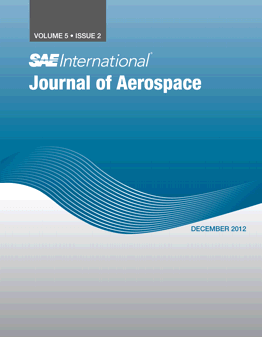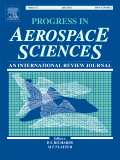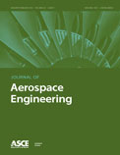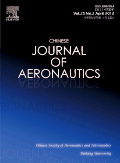
AEROSPACE AMERICA
Scope & Guideline
Charting New Territories in Aerospace Research
Introduction
Aims and Scopes
- Commercial Spaceflight Regulation:
The journal discusses the implications of regulating commercial human spaceflight, addressing safety, liability, and ethical considerations associated with this emerging industry. - Technological Innovations in Aerospace:
Aerospace America highlights breakthroughs in aviation technologies, including advancements in electric and hybrid aircraft, AI integration in cockpit systems, and enhancements in drone capabilities. - Sustainability and Environmental Impact:
The journal emphasizes the importance of sustainability within aerospace, covering topics such as decarbonization, the use of sustainable aviation fuels, and the environmental impacts of space launches. - Human Space Exploration and Robotics:
The publication explores the future of human space exploration, including missions to Mars, lunar bases, and the role of robotics in space missions, reflecting on both technical and human factors. - Safety and Risk Management:
Safety in aerospace operations is a critical focus, with discussions on collision avoidance, cybersecurity measures, and risk assessment methodologies to enhance operational safety.
Trending and Emerging
- Artificial Intelligence in Aerospace:
The integration of AI technologies in aerospace applications is gaining significant attention, focusing on enhancements in flight operations, predictive maintenance, and autonomous systems. - Advanced Air Mobility Solutions:
The journal increasingly covers topics related to advanced air mobility, including urban air taxis and eVTOL (electric Vertical Take-Off and Landing) aircraft, reflecting a growing interest in innovative transportation solutions. - Sustainability Initiatives:
There is a strong emphasis on sustainability initiatives, with articles discussing the development and implementation of sustainable aviation fuels and technologies aimed at reducing the carbon footprint of the aerospace sector. - Commercial Space Ventures:
The rise of commercial space ventures and private sector investments in space exploration is a trending theme, showcasing how private entities are shaping the future of space travel and exploration. - Cybersecurity in Aerospace Operations:
The importance of cybersecurity in aviation and space operations is increasingly recognized, with discussions on safeguarding systems against cyber threats and ensuring operational integrity.
Declining or Waning
- Traditional Propulsion Systems:
While traditional propulsion systems remain vital, there has been a noticeable shift towards innovative propulsion technologies such as electric and hybrid systems, leading to reduced emphasis on conventional engines. - Conventional Aircraft Design:
The journal has seen less coverage of conventional aircraft designs, as the industry increasingly shifts towards advanced air mobility solutions and innovative structural designs that prioritize efficiency and sustainability. - Space Debris Management:
Although still relevant, the frequency of articles specifically focused on space debris management and mitigation strategies has decreased, possibly due to a more general focus on broader space sustainability issues. - Military Aviation Innovations:
Discussions specifically centered on military aviation innovations have waned, as the journal's focus has shifted more towards civilian aerospace applications and technologies. - Legacy Systems and Technologies:
There is a reduced emphasis on legacy systems and technologies in aerospace, as the industry moves towards adopting cutting-edge technologies and modernizing existing platforms.
Similar Journals

SAE International Journal of Aerospace
Catalyzing Ideas for Tomorrow's Aerospace Challenges.The SAE International Journal of Aerospace, published by SAE International, serves as a critical platform for innovative research and advancements within the field of aerospace engineering. With an ISSN of 1946-3855 and an E-ISSN of 1946-3901, this esteemed journal contributes significantly to the body of knowledge in the aerospace sector, boasting a convergence span from 2008 to 2024. While currently categorized in Q4 of Aerospace Engineering, the journal is dedicated to fostering emerging ideas, technologies, and methodologies that could eventually elevate its standing. Although it does not offer open access options, the journal ensures wide dissemination of its well-curated articles to aid researchers, professionals, and students in staying abreast of the latest developments and trends. Given its distinct focus and commitment to the aerospace community, the SAE International Journal of Aerospace plays an essential role in bridging theory and practice, making it a valuable resource for those within this vital and evolving field.

AIRCRAFT ENGINEERING AND AEROSPACE TECHNOLOGY
Advancing aerospace innovation through rigorous research.AIRCRAFT ENGINEERING AND AEROSPACE TECHNOLOGY, published by Emerald Group Publishing Ltd, is a leading peer-reviewed journal dedicated to advancing the fields of aerospace engineering and technology. With a strong emphasis on innovative research, the journal aims to bridge theoretical developments and practical applications within the aerospace sector. Although the journal does not currently offer open access, it continues to enrich the academic community's understanding of aircraft design, maintenance, and engineering processes, making it a crucial resource for researchers, professionals, and students alike. By fostering a rigorous dialogue among experts, AIRCRAFT ENGINEERING AND AEROSPACE TECHNOLOGY ensures the dissemination of cutting-edge findings and promotes sustainable practices in the aerospace industry, highlighted by its commitment to high-quality scholarship.

PROGRESS IN AEROSPACE SCIENCES
Exploring the frontiers of aerospace engineering and technology.PROGRESS IN AEROSPACE SCIENCES is a prestigious journal published by PERGAMON-ELSEVIER SCIENCE LTD, recognized as a leading platform in the field of aerospace engineering, mechanical engineering, and mechanics of materials. With an impressive history dating back to 1961, the journal covers a wide spectrum of topics pivotal to advancing aerospace technology and innovation. Its recent ranking as Q1 in multiple engineering categories underscores its significance, ranking #1 in Aerospace Engineering and placing within the top 20 percentile in both Mechanical Engineering and Mechanics of Materials, according to Scopus assessments. Researchers, professionals, and students looking to engage with high-impact research will find PROGRESS IN AEROSPACE SCIENCES an invaluable resource, offering insights into cutting-edge developments and methodologies. Although it does not operate under an open-access model, the journal upholds rigorous peer-review standards, ensuring that the published content meets the highest academic integrity. Situated in the United Kingdom, it plays a critical role in fostering international collaboration and knowledge-sharing in the aerospace sector.

JOURNAL OF AEROSPACE ENGINEERING
Advancing aerospace innovation for a soaring future.JOURNAL OF AEROSPACE ENGINEERING, published by the American Society of Civil Engineers (ASCE), is a premier scholarly journal that serves as an essential resource for engineers and researchers in the aerospace engineering domain. With an ISSN of 0893-1321 and an E-ISSN of 1943-5525, this journal has been dedicated to advancing knowledge since its inception in 1988 and will continue to do so through to 2024. The journal is categorized in the Q2 quartile across multiple engineering disciplines, including Aerospace Engineering, Civil and Structural Engineering, Materials Science, and Mechanical Engineering, reflecting its reputable standing in the community. The impact factor speaks to its influence and relevance, making it a critical reference for ongoing research and innovations. Although this journal does not offer open access, it ensures that its content is comprehensive, engaging, and peer-reviewed, targeting a diverse audience of professionals, academics, and students involved in the fields of aerospace engineering and related disciplines. The journal actively contributes to shaping future engineering practices, showcasing cutting-edge research and fostering collaboration among discipline experts.

Aerospace Research in Bulgaria
Exploring the frontiers of aerospace technology.Aerospace Research in Bulgaria is a prestigious academic journal dedicated to advancing the field of aerospace engineering and technology. Published by the BULGARIAN ACADEMY OF SCIENCES, SPACE RESEARCH & TECHNOLOGY INSTITUTE (SRTI-BAS), this journal serves as a key platform for researchers, engineers, and professionals seeking to share original research, innovative technologies, and critical reviews related to aerospace applications. With the ISSN 1313-0927 and E-ISSN 2367-9522, the journal aims to contribute significantly to the global aerospace community. Although the journal operates under a traditional access model, it emphasizes the importance of research collaboration and disseminating knowledge in the ever-evolving aerospace sector. The editorial team is committed to maintaining high standards in peer review, making it an essential resource for academics and practitioners alike. Located at ACAD. GEORGI BONCHEV STR., SOFIA 1113, BULGARIA, this journal not only highlights Bulgarian contributions to aerospace research but also aims to engage with a broader international audience, fostering advances that propel the industry forward.

Aerospace
Inspiring the Next Generation of Aerospace InnovatorsAerospace is a premier open-access journal published by MDPI, established in 2014 and dedicated to the dynamic field of aerospace engineering. With an impressive Q2 ranking in the 2023 category of Aerospace Engineering, this journal is a vital resource for researchers, professionals, and students interested in advancements and innovations in aerodynamics, avionics, propulsion, and more. Operating from Switzerland, Aerospace provides a platform for the dissemination of high-quality research articles and reviews, contributing to the ongoing dialogue in the aerospace community. This journal not only enhances visibility through its open access model but also ensures that critical knowledge is freely available, fostering collaborative efforts and inspiring the next generation of aerospace engineers. With a Scopus ranking of #60 out of 153 in the Aerospace Engineering category, it plays a significant role in shaping the future of aviation and space exploration.

International Journal of Aviation Aeronautics and Aerospace
Navigating the Future of Aerospace Engineering TogetherInternational Journal of Aviation Aeronautics and Aerospace, published by Embry-Riddle Aeronautical University, serves as a pivotal platform for the dissemination of innovative research in the fields of aerospace engineering, civil and structural engineering, and safety, risk, reliability, and quality. With an ISSN of 2374-6793 and designated as an open access journal since 2014, it enables unhindered global access to its scholarly content, fostering collaboration among researchers, professionals, and students in the aviation sector. The journal's presence spans from 2014 to 2024 and is recognized within the Q3 category across multiple engineering domains according to recent metrics. Despite its emerging status, it holds respectable rankings in Scopus, demonstrating its relevance and contribution to the academic community, particularly in dynamic engineering sectors. It is an essential resource for anyone looking to enhance their understanding of advancements and challenges in aviation and aerospace solutions.

Space Science and Technology-Kosmicna Nauka i Tehnologia
Advancing frontiers in aerospace innovation.Space Science and Technology-Kosmicna Nauka i Tehnologia is an esteemed journal dedicated to advancing knowledge in the fields of Aerospace Engineering and Space and Planetary Science. Published by the well-regarded PUBLISHING HOUSE AKADEMPERIODYKA in Ukraine, this journal serves as a vital platform for researchers, professionals, and students to share groundbreaking findings and innovative technologies related to space exploration and engineering techniques. Since its establishment in 2019, Space Science and Technology has contributed significantly to the academic discourse in its category, currently holding a Q4 quartile ranking in both Aerospace Engineering and Space and Planetary Science as of 2023. Although it does not offer open-access publication, its listed ISSN (1561-8889) and E-ISSN (2518-1459) ensure wide accessibility to its published content. As the journal continues its journey from 2019 to 2024, it strives to enhance its impact and H-index while fostering collaboration and knowledge dissemination across the global space science community.

Chinese Journal of Aeronautics
Connecting scholars to the skies of tomorrow.Chinese Journal of Aeronautics, published by Elsevier Science Inc, serves as a premier platform for cutting-edge research in the field of aerospace and mechanical engineering. With an impressive impact factor that reflects its significant contribution to the discipline, this Open Access journal has been disseminated globally since 2002, allowing unrestricted access to high-quality articles and research findings. The journal is recognized for its exceptional ranking, holding a prestigious Q1 category in both Aerospace Engineering (Rank #8/153, 95th percentile) and Mechanical Engineering (Rank #46/672, 93rd percentile) as of 2023. It publishes original research, reviews, and technical notes that enhance our understanding of aeronautics and its applications, making it an essential resource for researchers, professionals, and students alike. Located in New York, USA, the journal continues to foster innovation and collaboration in aeronautical sciences, shaping the future of aviation and space exploration.

Advances in Aircraft and Spacecraft Science
Advancing Technologies that Propel Aviation and SpacecraftAdvances in Aircraft and Spacecraft Science is a distinguished journal published by TECHNO-PRESS, focusing on the rapidly evolving fields of aerospace engineering and fluid dynamics. With an ISSN of 2287-528X and an E-ISSN of 2287-5271, this journal is an invaluable resource for researchers, professionals, and students dedicated to advancing knowledge in aircraft and spacecraft technologies. Established in 2014, the journal is committed to disseminating high-quality research findings and innovative methodologies, ensuring that cutting-edge studies can be accessed globally. Despite its current position in the Q4 category for both aerospace engineering and fluid flow transfer processes, it continues to carve a niche in the academic landscape, with Scopus rankings highlighting its contribution to these fields. Operating from South Korea, Advances in Aircraft and Spacecraft Science aims to inspire collaboration and knowledge-sharing among scholars, fostering advancements that drive the aerospace industry forward.